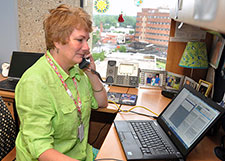Office of Research & Development |
 |
Office of Research & Development |
 |

VA Research Currents archive
June 9, 2014

Pamela Gentry is a nurse at the Durham VA Medical Center. Researchers there conducted focus groups to learn more about the pros and cons of scheduled phone visits as part of VA's new model of primary care. (Photo by Linnie Skidmore)
VA primary care clinics recently moved to a new model called Patient Aligned Care Teams, or PACT. The model features team-based care, with a greater role for non-physician providers such as nurse practitioners and physician assistants. It also offers expanded hours and availability, with more emphasis on preventive care, and close coordination with specialists when needed.
Scheduled phone visits are one way to allow for more frequent contact between patients and their providers on certain issues, in a way that's convenient for patients. But is there a downside? Do patients feel they are getting the care they need? Do providers have concerns about the arrangement?
These and other questions were addressed by researchers at the Durham VA Medical Center. They held focus groups to explore potential facilitators and barriers to using scheduled telephone visits in primary care. They talked to patients, providers—usually physicians, physician assistants, or nurse practitioners—and other clinic staff, such as nurses and administrators. The focus groups, seven in all, took place in 2010, when the transition to PACT was just getting under way.
"Now, VA is moving toward wider use of scheduled phone visits as part of the PACT model," says lead author Dr. Nina Sperber, with Duke University and VA's Durham-based Center for Health Services Research in Primary Care. "We believe the findings from our focus groups are useful in learning how to effectively develop this mode of care in line with principles of the patient-centered medical home."
Sperber and her team reported their results in BMC Health Services Research. Among the findings:
All in all, the researchers say that scheduled phone visits seem acceptable to all parties involved, and that used in the right way, they could "serve as both a substitute for in-person care for certain situations and a supplement to in-person interaction." The researchers added that the calls "could be used in a targeted way for routine physical and mental health needs as part of a tiered approach to communicate with patients." Always, patients should be given a choice.
The focus group findings mesh with clinical studies on the outcomes of phone visits. Studies suggest that not only can phone visits be used successfully for straightforward "focused" issues, such as follow-up after a procedure or medication change, but they can also help in more complex tasks, such as making new treatment decisions, or providing advice on self-care. They can also help improve the "uptake of preventive health programs," write Sperber and her coauthors.